What a woman!
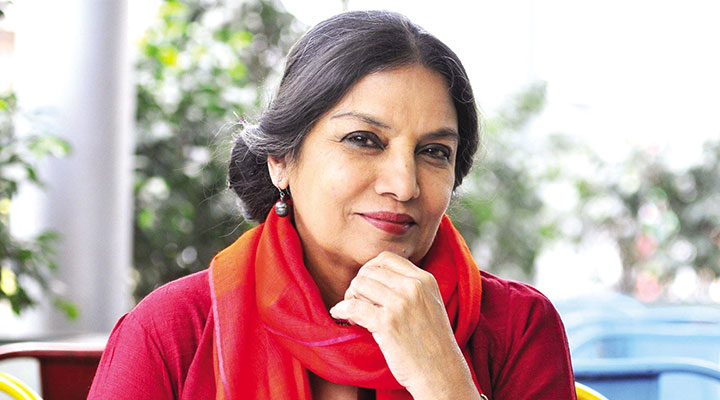
During an animated conversation with Priyanka Chandani, actor and activist Shabana Azmi spoke at length about her NGO Mizwan, her views on women and child empowerment in the village, representation of women in Hindi cinema over the years, and how her relationship with Javed Akhtar has evolved over the years.
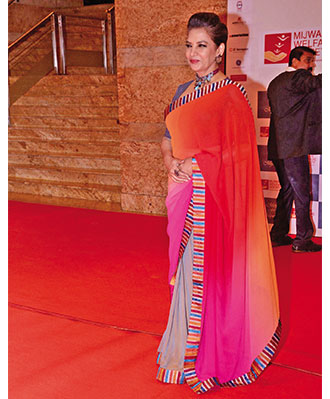
She is fierce, she is bold, she is progressive and she is unapologetically opinionated. She is Shabana Azmi — often credited as the Meryl Streep of India and the country’s only actress to have won five National Awards for best actress, the Padma Shri and Padma Bhushan and even a seat in the Rajya Sabha! She also won the Best Actress award for her role in the film Sheer Qorma at the India Film Festival of Boston 2021. At the age of 73, the actor has helped redefine the kind of roles women portray in Hindi cinema and more often than not, she has roles written specifically for her. She has stood strong in her film choices and also paved the way for the transition and transformation of women through her work of art.
Apart from her illustrious career as an actor in Hindi cinema, Azmi is a force to reckon with when it comes to giving back to society. Marching on the path of her father’s initiatives and ideologies, mostly communist, Azmi knows where there’s a need to contribute and how one can uplift an entire village by just having the right vision. It is probably her work for a society that earned her Britain’s oldest ‘Freedom To City’ award in London given by the London Corporation at Guildhall, earlier in May. Previous recipients are Nelson Mandela, Stephen Hawking, and Florence Nightingale. The actress was in London to celebrate her 50 years in cinema at the annual UK Asian Film Festival (UKAFF). “I am overwhelmed to receive this award that previously has been given to people like Nelson Mandela and Stephen Hawking,” says the actor.
However, our interview with her was not about her cinematic journey but something close to her heart more than her films – Mijwan, a village in Azamgargh where her father and legendary poet Kaifi Azmi was born. He founded the Mijwan Welfare Society in 1993 which is now run by Shabana.
Apart from her illustrious career as an actor in Hindi cinema, Shabana Azmi is a force to reckon with when it comes to giving back to society.
An ode to her father
Mijwan, a village that did not even have a pin code to its name, has empowered the village women such that Hollywood actors Naomi Campbell and several Bollywood actors are clients of their embroidery. “Women are running beauty parlours and organizing fashion shows all by themselves,” she says.
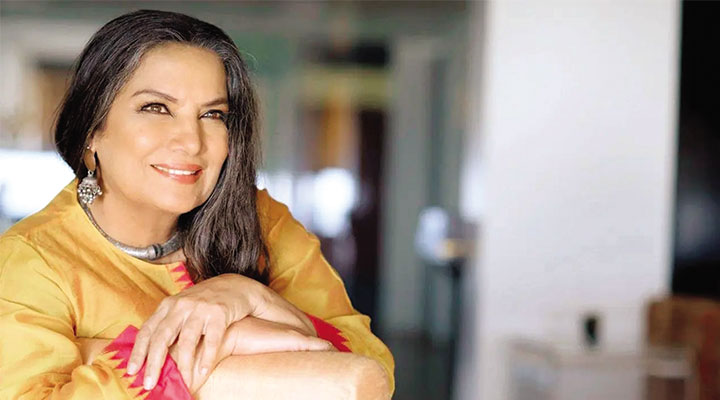
Mijwan also has a sustainable livelihood centre for women where they create their embroidery using the brand name ‘Made in Mijwan’. working with designers and brands such as Manish Malhotra, Manish Tripathi, L’Oréal, ODRA and SND the rural women can earn an average of INR 3500 per month doing Chikankari work. The village not only has women working on different crafts, especially embroidery and clothing but also collaborates with Bollywood’s ace designer Manish Malhotra for their annual showcase – Mijwan Fashion Show in Mumbai. Almost every top actor in Hindi cinema has walked the ramp wearing couture made by the women of Mijwan. This year, celebrity couple Ranveer Singh and Deepika Padukone walked the ramp at the Mijwan Fashion Show in collaboration with Manish Malhotra in February. “Mijwan’s annual show had a break of three years and we missed it so much to showcase the work of our women in the village. This year, there was a whole new collection that Mijwan girls worked with Manish (Malhotra),” she says. “It’s not only the celebrity status but also the kind of women these girls do with the craft. They deserve it and I am all there to support when it comes to empowering women in the village,” she adds.
United she stands with the women of Mijwan
Sustainable education for girls is the prime work at Mijwan. To ensure quality education for girls from the most deprived section of the community the NGO runs Kaifi Azmi Girls Inter College at Mijwan village. “It’s a school from the 9th -12th class and offers admissions to the girls from the most disadvantaged community (mainly daily wage earners). At present, there are 312 girls from about 10 villages who are studying in this school. More than 6500 girls have passed out from this school and many of them are pursuing higher studies and doing work in different sectors,” she states.
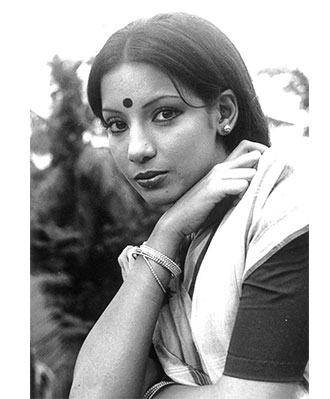
She also added that the school adopted a new model of teaching RNSF-Recorded-Notes-Share and Feedback model where the school created an online platform on one drive. Teachers every day recorded their sessions, made notes and uploaded them and the link of this one drive was shared with all the students who have smartphones. On the one hand, they could go on the link, listen to the recordings, and go through the teachers’ notes. After which they can also share their feedback on the link. On the other hand, for those students from families that didn’t have smartphones, teachers were reaching them with their handwritten notes, and books and were also assisting them through phone calls at an allocated time to clear their doubts. “This helped students continue their education even during the lockdown period. The RNSF model works well and is possibly a good solution for rural schools in India,” she believes.
Empowering women
Some of the initiatives of the Mijwan Welfare Society include a livelihood centre for rural women, started with only one woman in 1993, who was trained by Mijwan from Lucknow. That one woman trained many women in Mijwan and gradually, the village now has 350 women enrolled and working at the center earning Rs 3500 per month. This has created a cascade of job opportunities for women in Mijwan.
Mijwan Welfare Society through its Kaifi Azmi Sports Academy at Mijwan Village supports and promotes rural sports talent, especially in the field of badminton. It has a wooden indoor badminton court, where currently more than 40 rural youths are undergoing training by a national-level badminton player. Another initiative, Rozgar Dhaba is a physical village information exchange centre to provide information on local jobs, government schemes, health schemes, and options for livelihood and minimize unsafe migration and unemployment. “With this centre, we aim to reach remote villages and search and train sports talent from villages. The centre also has a program on yoga and physical exercise for youths and the elderly,” she informs. To address community health, there are local health institutions like CHC and PHC to increase the outreach programs. The Kaifi Azmi Computer Training Centre (KACTC) initiative by the NGO is set up to impart computer education to rural youths to make them capable of getting technology-related livelihood options emerging in villages as well as in cities. In the last few years, Distance learning has become a reality in Mijwan. The girls of Mijwan’s Kaifi Azmi School are getting English lessons from the US and London through Skype. Through MWS the urban-rural divide has been successfully bridged.
“I would say we did some brilliant work in the pandemic. I was quite shocked. With reverse migration, people were coming back to villages but there was no work so we built up centres called Rozgar Dhaba where we were tying up with people who wanted jobs and with the centres where they could get those jobs. What happens is that the government has a whole host of welfare schemes but they never reach people, so we became a source to make that space available for them. Many other programmes benefited many women and widows and I am very proud of that,” she flaunts.
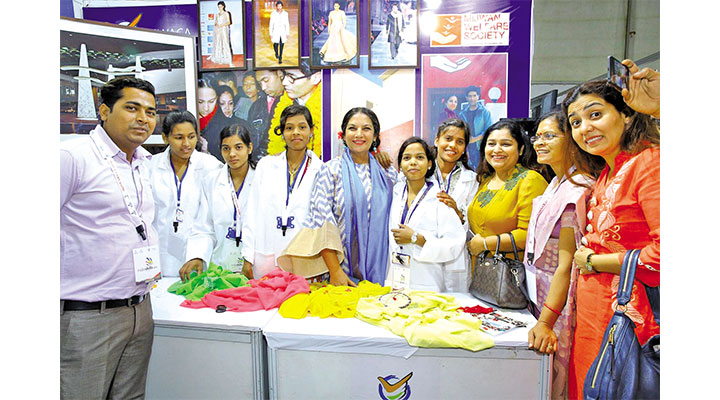
I was very lucky to be at the right place at the right time. That’s why I am very grateful to my directors and writers who had the gumption to make those films.”
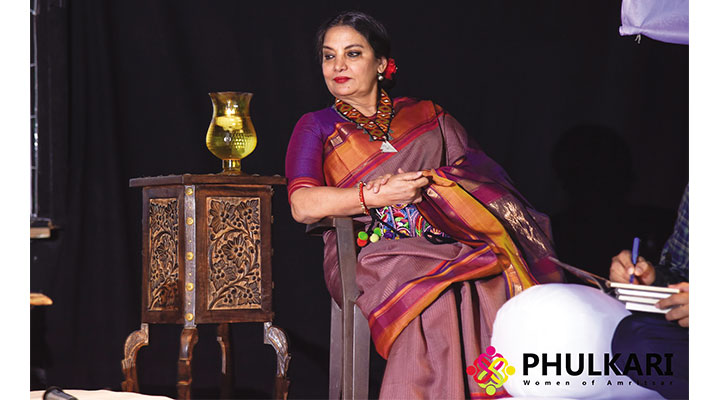
Shabana on duty
During COVID-19 when the world was forced to take a halt, Mijwan women made masks which helped them run their household. Shabana, using her celebrity status for good, promoted their labour to support the village. Additionally, Shabana’s brother and filmmaker Baba Azmi launched a girl from Mijwan as a protagonist in his film Mee Raqsam. “The film was a tribute to my father who stood with me when I chose to become an actor. At the age of seven, I wanted a doll with blonde hair and blue eyes like other girls in my class. But my father gave me a black doll and said ‘black is beautiful’. Telling this to a seven-year-old was quite peculiar, but these were the values I inherited from him and with MIjwan, I am just fulfilling his vision,” says the actor. Another documentary film Kaifinama, directed by Sumantra Ghosal was produced by Azmi’s MIjwan Welfare Society. Tracing his roots in the small town of Mijwan, his commitment to socialism, and his extensive body of work, Kaifi’s journey is documented through several interviews with Azmi and her brother Baba Azmi, along with his late wife Shaukat Kaifi.
It was the same time when Mijwan Welfare Society started working in the areas of disaster relief and rehabilitation and collaborated with different stakeholders to provide immediate support to communities in the form of dry ration support, hygiene kits, and assisting communities in applying for different government programs. “We collaborated with 22 Panchayats and the National Disaster Response Force (NDRF) to spread our COVID-19 relief work,” recalls the actor. “We reached more than 225000 people in over 300 villages through our relief work,” she adds.
Celebrating achievements
Sharing success stories of the villages in Mijwan, Azmi said people generally undermine the impact of music and theatre in personality development. She said her mother Shaukat Azmi used to give the girls lessons in theatre, “And there was, and still is, an evident change in their personalities,” she says.
The village now has no girl married before the age of 18 which, Azmi said was possible only after a long struggle to bring about such positive change in the lives of women. Additionally, the state of Uttar Pradesh also has the All India Kaifi Azmi Academy in Lucknow. It is the sheer determination of Azmi that the academy has been functional since 2016. The academy works for rural development, poverty alleviation, vocational training, Dalit upliftment, minority issues, animal husbandry, dairying, and fisheries, agriculture, art and culture, children, differently abled, drinking water, education and literacy, health and family welfare, HIV-AIDS, human rights, legal awareness and aid, microfinance SHGs, tribal affairs, and women empowerment. “I want to make this academy a sort of an adda for intellectual arguments, debates and discussions. UP has a lot of talent. The advantage of good language, pronunciation and finesse comes as a natural talent to people in Up,” she said.
Showstopper Shabana
In her five-decade-long career, the actor has done both arthouse and mainstream films, besides her stage productions. Her films like Arth, Paar, Bazaar, Nishant, Sparsh, and Deepa Mehta’s Fire have been the milestones of her career. She also ventured into mainstream films like Parvarish, Amar Akbar Anthony, and Avtaar among many others very successfully.
However, Azmi finds that cinema has changed completely. “We are looking for real-life stories in content, and a lot of biographical films are being made. I don’t know how long the trend will last, but I like watching these films. We have more liberty in filmmaking and there is good content coming up,” expresses the actor.
Act II
Having an illustrious body of work as an actor, each role different from the other, Azmi is also straddling other roles away from films. What motivates her to work so hard, especially to take up challenging roles? We ask. “I always like to try new things. As an actor, it is your job not to stick to the same thing and break your structure every time. I can’t do the same thing because then I have nothing new to do. I am working on different dimensions and always looking for something new — learning new things is what inspires me. Do you see how many worlds I straddle? While I am on my way to the premiere of some film in LA, doing academics for Mijwan with Southampton and then in India, there is so much work with Mijwan’s upcoming events. This is what keeps me excited. I am always motivated because I don’t get tired of the work that I am doing and discovering new things,” expresses the actor.
School of acting…
While many actresses today assert that cinema is now focusing on women-centric roles, Azmi has always been a been there, done that woman. Case in point her body of work includes films like Arth, Ankur, Mandi and Nishant (all women-centric characters). So one cannot help wondering if cinema was far more progressive then; and women had a stronger presence in such films. Azmi thoughtfully opines, “There has been a steady improvement. If you look at the films in the ’60s, many were female-oriented and female actors such as Waheeda Rehman, Meena Kumari and Nargis played very powerful roles. But at that time, women were portrayed in very traditional roles. Main Chup Rahungi (I will stay silent) was considered a virtue for a woman. After that, we went through a period when we had films like Zakhmi Aurat and Jeene Nahin Doongi. So, it was like, first you had Rambo and now you had Rambolina and none of these roles had any complexities of what it means to be a woman. It was left to the parallel cinema to define those women. I was very lucky to be at the right place at the right time. That’s why I am very grateful to my directors and writers who had the gumption to make those films. I think very often what happens is that the producers think that this is what society is ready for, but society has moved on because now with the advent of OTT, we have many faces. I also think it is a platform that should be extensively used to create its stars. We have only a handful of stars. I feel a little disappointed that OTT is also chasing these stars. I don’t think that was their mandate.”
If you do not make your relationship the only ‘raison d’être’ of your existence then you don’t put so much pressure on the relationship.”
Bond for life
Beyond her cinema presence and her social work, it’s also the bonding of more than three-and-a-half-decades of her marriage with lyricist Javed Akhtar that is inspiring to many. “I think the strongest glue that binds us together is respect and friendship. We have a lot of respect for each other. Javed is very fond of saying that we have such a good friendship that even marriage couldn’t break that. But it’s also because we have a common worldview and we come from a very identical background — our parents as progressive writers, members of the communist party, part of progressive movements and all of that. So, even if some occasional differences pop up, our basic structure of thought comes from the same cloth. And we also give each other a lot of space. I am happy that Javed is with me here, but there is a lot of time that we spend away from each other too. So, I think if you do not make your relationship the only ‘raison d’être’ of your existence then you don’t put so much pressure on the relationship. I think it is the space that we have given each other that helps our relationship work,” says the actor before signing off.
BREAKS
Apart from her illustrious career as an actor in Hindi cinema, Shabana Azmi is a force to reckon with when it comes to giving back to society.
It is probably her work for a society that earned her Britain’s oldest ‘Freedom To City’ award in London given by the London Corporation at Guildhall, earlier in May.
“Mijwan’s annual show had a break of three years and we missed it so much to showcase the work of our women in the village. This year, there was a whole new collection of Mijwan girls working with Manish (Malhotra).”
What happens is that the government has a whole host of welfare schemes but they never reach people, so we became a source to make that space available for them. Many other programmes benefited many women and widows and I am very proud of that.”
“I always like to try new things. As an actor, it is your job not to stick to the same thing and break your structure every time. I can’t do the same thing because then I have nothing new to do.”
“I was very lucky to be at the right place at the right time. That’s why I am very grateful to my directors and writers who had the gumption to make those films.”
“If you look at the films in the ’60s, many were female-oriented and actresses like Waheeda Rehman, Meena Kumari and Nargis played very powerful roles. But at that time, women were portrayed in very traditional roles. Main Chup Rahungi (I will stay silent) was considered a virtue for a woman. After that, we went through a period when we had films like Zakhmi Aurat and Jeene Nahin Doongi. So, it was like, first you had Rambo and now you had Rambolina and none of these roles had any complexities of what it means to be a woman.”

